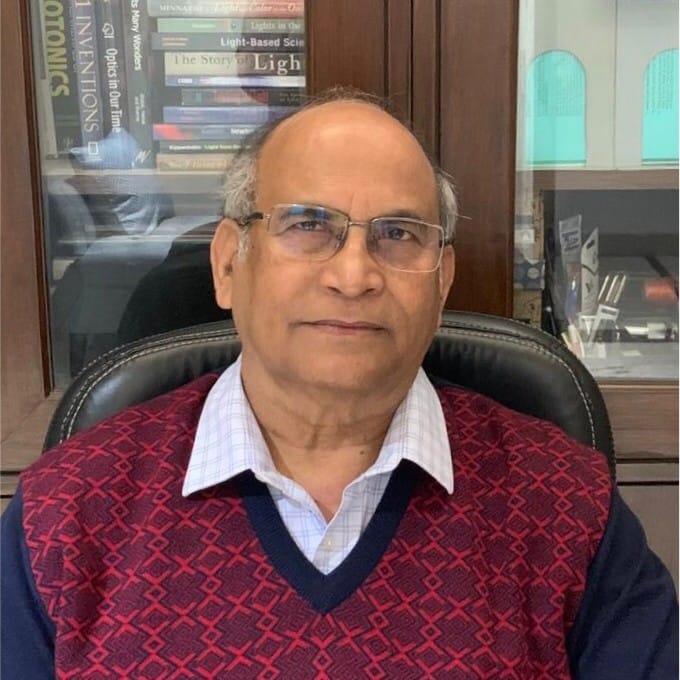
Dr. Zahid Husain Khan (Retd.)
Professor (Department of Physics)
Department of Physics, Jamia Millia Islamia, New Delhi-110025
Zahid Husain Khan had his higher education from Aligarh Muslim University, Aligarh (India), where he obtained B.Sc. (1967), M.Sc. (1969), M.Phil. (1971), and Ph.D. (1975) degrees. In 1976 he joined Jamia Millia Islamia (a Central University), New Delhi as Lecturer in Physics and was appointed as Professor of Physics in 1994. He served the university for 39 years. His research interests are primarily in the fields of Optics & Spectroscopy, Lasers and Photonics, Materials Characterization, and ICT in education. He has published more than 60 research papers in peer-reviewed journals of international repute and has guided 15 research scholars leading to their Ph.D. degrees.
Prof. Khan has vast experience in university administration and has held the positions of the Head, Department of Physics, Dean of Students’ Welfare, and Registrar of the University. He is an expert in university laws and had been the Chairman of the Standing Committee for Act, Statutes and Ordinances of the University from 2007 to 2014.
He also served as the Director of FTK Centre for Technology of the University from 1998 to 2014, and subsequently as its Honorary Advisor. During this period, he developed the state-of-the-art ICT facilities in the university. Recognizing his rich experience in higher education and ICT, the Ministry of Human Resource Development, Government of India, coopted him as a member of the Standing Committee for the National Mission of Education Through ICT (NMEICT) during 2009 - 2014. In addition to his usual responsibilities in the university, Dr. Khan served the Delhi Education Society for 17 years in the capacity of its Honorary Secretary from 1998 to 2007 and Vice-President from 2008 to 2015.
Prof. Khan has been a DAAD Fellow at the Ludwig Maximilian University, Munich, Germany (1980-1981) and Free University Berlin (1981-1982). He has also been a Visiting Scientist in the University of Kaiserslautern, Germany in 1987. Recognizing his outstanding commitment and leadership in promoting Indo-German Relations in the field of education, he was awarded the title of Honorary DAAD Advisor (2006 – 2009) by the President of DAAD, Bonn, Germany.
Following declaration of 2015 as the International Year of Light and Light-based Technologies (IYL 2015), the UNESCO nominated Prof. Khan as a National Contact for India for IYL 2015. In 2015, he was also nominated as a member of the Steering Committee of the International Working Group on Ibn Al-Haytham, as part of the UNESCO’s campaign. From 2016-2020, he had been an elected Vice-President of the Ibn al-Haytham LHiSA (Light, History, Science and Applications) International Society, with the headquarter in Paris, France. Prof. Khan was also co-opted by UNESCO-IDL as the National Contact for India for International Day of Light since its inception in 2018. In view of his active engagements in promoting the International Day of Light, the UNESCO in 2021 has included him in the list of its Light Alumni and the Founding Signatories of Trust-in-Science Campaign.
Currently Prof. Khan is an Advisor of Zaheer Science Foundation, New Delhi, which is a think-tank, engaged in science and technology policy & innovation, popularization of science, and ICT in Education. Prior to this, in 2022 he served as the Vice-Chairman of the Foundation. Since 2020 he had been associated with Vigyan Prasar, Ministry of Science and Technology, Government of India, as a member of the SCoPE in Urdu Core Committee. Prof. Khan has published several popular articles in the Vigyan Prasar’s bilingual (English and Hindi) monthly newsletter ‘Dream 2047’ as well as in its Urdu newsletter ‘Tajassus’. He has also contributed popular science articles in the ‘Urdu Science Monthly’ magazine.
Prof. Khan has travelled extensively in Europe and some countries in North America, Middle East and Asia Pacific to deliver invited talks and participate in various thought leadership forums. He has been the member of important committees in various Indian universities and has been providing them advisory services on diverse issues ranging from academic excellence to effective governance models.









